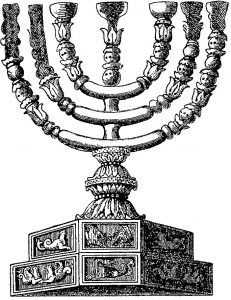Today’s ‘Parashah’ (weekly Torah portion) is ‘Beha’alotecha’ {בהעלותך} (‘when you step up’). This is the third ‘Parashah’ in the Book of Numbers and can be found in Numbers 8:1–12:16.
The name of this weekly Torah portion is a bit ‘mouthful’ because like many biblical Hebrew words, this word is actually made up of three grammatical parts. The first part is the prefix ‘Be’ {ב}, which is a preposition that means in this case ‘when.’ Then we have the body of this Hebrew word which is a verb ‘Ha’a’lot {העלות} – which drives from the Hebrew root A-L-H {ע-ל-ה} that its meaning is ‘to go up’ or ‘to ascend’ and can be found in the phrase ‘to make Aliyah’ (‘to move to Israel’).

The last part of this Hebrew word is a suffix which is very common in biblical Hebrew but less common in Modern Hebrew, and that is the ‘possessive affix’ – which in our case is ‘Chah’ {ך} and means ‘you’ in English.
‘You’ in this case refers to Aaron the priest, as can be seen in the opening of the weekly Torah portion:
“Now the LORD spoke to Moses, saying, “Speak to Aaron and say to him, when you set up the lamps, the seven lamps shall give light in front of the lampstand.” (Numbers 8:1-2)
‘Rashi’ who is the most famous Jewish Bible commentator in Jewish history (lived in Germany and France in the 11th century), asked the following question in regard to the last issue of the previous weekly Torah portion (‘Naso’), which speaks about the offerings that the chief’s of Israel brought to the Tabernacle:
“Why is the portion dealing with the Menorah juxtaposed to the portion dealing with the chieftains? When Aaron saw the dedication [offerings] of the chieftains, he felt distressed over not joining them in this dedication-neither he nor his tribe. So God said to him, “By your life, yours is greater than theirs, for you will light and prepare the lamps.” ‘Rashi’ did not elaborate about the reason why the lighting of of the lamps is greater than the offerings of the chiefs of Israel.
A Medieval Jewish Bible commentary gave us an explanation for this question, by discussing an old Jewish saying: “the offerings (sacrifices) lasted as long as the Temple in Jerusalem was standing but the lights (lamps) are lasting forever.”
According to this Medieval Jewish Bible commentary, it means that while the sacrifices in the Temple ceased to exist after the destruction of the Temple, the candles of the Chanukah’s Menorah on the other side, are still lighting every year in order to mark the great miracle of the Maccabees who are Aaron’s descendants.
